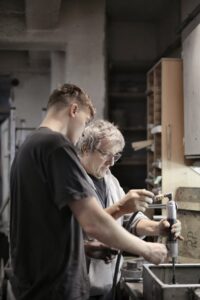Your career path isn’t always defined by job history
Everyone remembers the kid that wanted to be a firefighter, astronaut, scientist, and more, all at the same time.
Maybe you were that kid yourself! It’s a popular trope for a reason: who doesn’t want to imagine themselves holding a range of interesting roles over the course of their lives? Yet once you get settled into a particular career track, or bounce around a series of odd jobs trying to find the shoe that fits, it can be hard to find an angle to make a change.
The good news is, more people are switching career paths than ever before. In one recent report, 51% of employees said they have moved from one department to another (e.g. from finance to marketing) or from one profession to another (e.g., from the military to software).
To shed some light on how you can approach your next career crossroads – or whether you should be hiring outside the box – we spoke to Henry Nicholas consultant Stan Livingstone, who wore a range of hats before joining the team.
Stan’s fascinating background saw him spend years in engineering, sales, and the police force before working for Henry Nicholas – where he’s been able to help people with similarly diverse backgrounds capitalise on their transferable skills and take the next big leap.
The foundation of a good employee can be built anywhere

In a previous era, a university degree was nothing short of a requirement for most office jobs. But this mindset is less prevalent than before, and university is no longer the default choice for many people who aren’t sure what they want to do next. Gaining experience in any kind of field is just as advantageous – and sometimes more so.
Stan, for example, had no idea what he wanted to do but still opted to give university a miss. Instead, he joined an engineering firm as an apprentice, where he held a variety of job roles both in the office and out on job sites before deciding it wasn’t for him and looking for the next step.
You don’t necessarily need to join an engineering firm to see how transferable skills and experience helps you build a strong foundation in multiple industries. Successful baristas, landscapers, taxi drivers and a range of other jobs overlap significantly when it comes to the base qualities that every good employee needs – adaptability, dedication, and an openness to learning new skills. So reassess what you’ve done in the past and it’s very likely that you too will find instances where you’ve demonstrated the same capabilities!
Transferable skills are often as important as specialist skills
Once you move past the core competencies, it’s your more specialised transferable skills that will help you reach the next level. Stan pivoted to a sales role for a jewellery brand, followed by a stint selling marketing packages for an agency.
“There I was able to cut my teeth in cold calls and selling,” says Stan,“and those skills have certainly helped me along the way.”
Making another definitive 180, Stan then decided to join the police force. “That was quite an experience,” says Stan. “There I learned the ability to balance high and low priority tasks, work under pressure, and remain adaptable in an ever-changing stream of new situations.”
Perhaps you can see where we’re going with this now? Each new scenario you find yourself in expands your arsenal of references to draw upon when something new crosses your path. Even if the direct job experience isn’t the same, in a nutshell, it often doesn’t matter if you can apply what you’ve learned to a new context.
Employers can find golden hires when they consider the left field
A lot of candidates may think that employers aren’t going to take them seriously because of how varied their experience is, but sometimes it just takes a bit of prodding in the right direction to help connect the dots.
 “It can be like getting blood from a stone,” Stan says about some of his experiences talking to candidates who’d never been questioned so deeply about their job history.
“It can be like getting blood from a stone,” Stan says about some of his experiences talking to candidates who’d never been questioned so deeply about their job history.
“One candidate for a marketing gig talked for ages about the more physical side of his brewery job, before letting it slip that he’d actually done a branding project for them as well, which made perfect sense in the context.” Spotting these kinds of marketable experiences isn’t just an important exercise for candidates, either. Employers can certainly benefit from having a fresh pair of eyes to help them discover their blind spots too.
We mentioned how lots of people used to go to university as a ‘default’ option? Well, the same sort of mindset can exist for employers too, where they only look for one specific kind of candidate for one specific type of role before someone helps them see the light.
“When I acknowledge to an employer that a candidate might be a bit more left field,” Stan says, “and I’m still able to explain why their experience still makes them a good fit, that’s when doors that were seemingly closed tend to open.”
Talking to a recruitment expert can help you find the hidden hire you need, or uncover the keys you already have to the career you want. With decades of collective experience under their belts, Henry Nicholas’ team is ready and waiting to help you find your next role or hire, whatever it may be! Get in touch with our team today to start the process!



